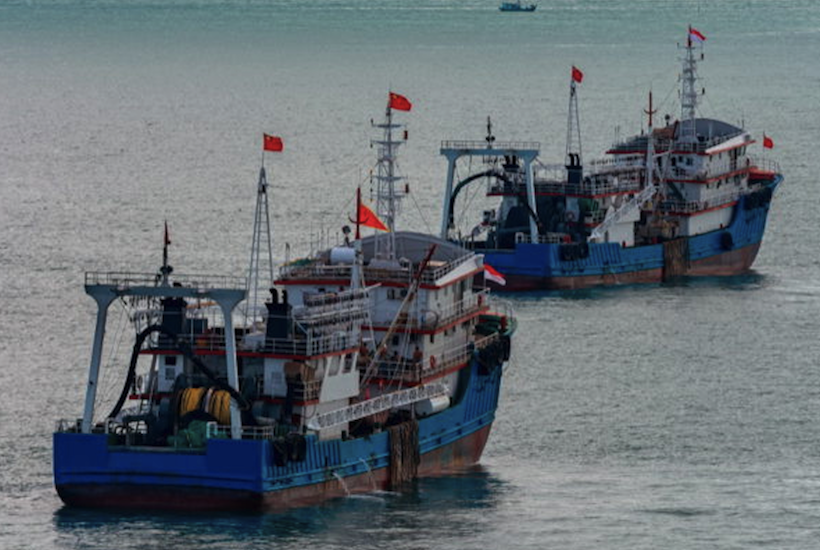China is an eco-serial killer.
When it’s not poisoning, re-landscaping or using Asia’s waterways to blackmail its neighbours, the Communist nation heads down South to rape Australia’s carefully maintained oceans in the Antarctic Territory.
It is a brazen hunting exercise in which China navigates Antarctic treaties as if they were inconsequential cracks on the pavement.
While tourists are fined if they step on the wrong rock or touch a penguin, predatory nations remain free to engage in mass-murder expeditions. It is an environmental pattern repeated around the world that leads us to ask, are citizens locked out of national parks to ‘protect nature’ or because governments don’t want them to see the destruction created by so-called ‘green’ nations?
Australia spends a fortune preserving its sizeable domain in the Southern Ocean while China helps itself to the protected sea life. On the menu today? Krill.
Krill are tiny shrimp-like creatures that populate the world’s oceans. They have a cruel lot in life, stuck at the bottom of the food chain like an aquatic savanna with feelings.
Far from being vegan-friendly, marine life depends upon these tiny protein snacks to hold up the entire ecosystem. Krill eat phytoplankton, making them the creature responsible for transforming the sun’s energy trapped in aquatic plant life into a food source. More importantly to the eco-zealots at COP26, krill act as an enormous carbon sink, consuming carbon-rich algae from the underside of pack ice before their waste sinks into the abyss.
Just because krill hold the coveted position as a ‘dominant animal species’ it doesn’t mean we should declare open season on their slaughter.
Krill move in swarms with up to 30,000 squished into a cubic metre. This makes it easy to siphon huge volumes of them out of the water in a single trip. Various nations are involved in a krill-killing arms race which has resulted in super-trawlers of over 120-metres capable of harvesting 240,000 tonnes per year.
It is not as if we’re emptying the world’s oceans for a good reason. Krill aren’t a miracle cure for cancer or some secret fuel for faster-than-light travel. Almost all krill meat is used as food in fish farms, livestock feed, and an additive in pet food. Japan also produces a range of krill oil and pastes.
While yes, some of the krill catch is used for medical applications, that number holds steady in the low 15-17%. The expanding medical market in Asia for krill mimics the old ivory trade where krill promises to cure everything from high blood pressure to Communism depression.
The Antarctic krill industry died off briefly to facilitate the recovery of the penguin population, but it has returned to full strength with South Korea, Norway, Japan, Poland, and China helping themselves to Antarctica’s resources.
The 2019-2020 krill harvest saw 450,782 tonnes taken from Antarctic waters – up from 106,600 tonnes in the 2005-2006 period.
China’s goal is to become the number one krill hunter. They have commissioned three super-trawlers to vacuum krill on an industrial scale of 240,000 tonnes per year. Their 120 metre Shen Lan will be on the prowl as early as this summer with an even larger sister ship on order. China already has eight trawlers in the area operated by government-backed companies.
These new super vessels are being marketed as ‘environmentally friendly’ because of how efficiently they empty the ocean of krill. Sustainable? No. Environmentally friendly? No. Are the eco-warriors at COP26 going to mention it? Of course not.
Norway’s krill catch landed value is sitting at 104 million NOK in 2019, up from 17 million NOK in 2009. As the current krill fishing giant, they are actively scouting new krill fields in Antarctica with the hope of dramatically expanding their industry.
“Humanity is growing out of the planet we live on. We need food. There is an increasing need for protein, and krill provides high-quality protein. Krill fishing could replace other fisheries that are currently over-taxed,” said Bjørn Krafft from the Institute of Marine Research.
‘’We have covered a large area to map the extent and amount of krill. We have had people on land on three different islands and marked penguins, seals and whales with satellite transmitters. These are among the animals that rely on krill as food. We need to find out how much food they need and how much to take out.”
Humans are apex predators. When we start erasing the bottom of the food chain, everything else in the middle dies off. According to some researchers, krill populations have dropped 80% since the 1970s and there are concerns this could lead the penguin population to drop by a third.
Climate Change researchers ‘um and ah’ about the causes for declining krill levels, attempting to blame it on pack ice or acidification – neither of which carries any reliable evidence. The more obvious answer is the expanding krill industry. They are being over-fished, it’s as simple as that. Voicing that accusation hurts the feelings of very powerful nations, which is why the soft-spined political species in Australia say nothing.
Greg Hunt is to protecting Antarctica what hairspray is to Matt Kean – pointless. When questioned about the mounting pile of evidence regarding China’s ill intentions, Hunt (who was Minister for the Environment at the time) simply repeated the same old platitudes.
“The Memorandum of Understanding on Antarctic Cooperation signed during the Chinese president’s November 2014 visit to Hobart reaffirms both countries’ enduring commitment to the peaceful use and environmental protection of Antarctica. This was very significant as it re-commits China to the principles of the Antarctic Treaty which includes no mining,” said Greg Hunt.
Under the current Minister Sussan Ley, 2.8 billion has been announced for Antarctic research and conservation with 1.9 billion of that figure set aside for a new icebreaker – none of which will stop China’s ambition. The weaker Australia becomes militarily, the less protection we offer the ancient landscape.
Twenty-six nations belong to the Commission for the Conservation of Antarctic Marine Living Resources (CCAMLR), a management organisation set up in 1982 to address the exploitation of krill. The fishing limitations involve a great deal of guesswork, with researchers unable to calculate the real density or extent of the krill population.
Essentially, the CCAMLR have no idea what the impact is of removing krill from the ecosystem, so they set precautionary limits and then monitor the impact. Accurately assessing a complex environment at the sparsely populated fringes of the world, uninhabitable to humans for several months of the year with a large portion of it trapped beneath impenetrable pack ice – is beyond our ability.
Conservation is a nice idea, but it is easily overwhelmed by commercial demand. If push came to shove, there is very little prospect of defending Antarctic waters from super-sized Chinese fishing vessels.
What happens instead is that the CCAMLR revises its catch sizes up to meet international fishing quotas delivered with a few cross words. These researchers know that krill fishing has a negative impact on Antarctic animals that feed on krill, but using eco-politics to cover up over-fishing is a real problem in academia. It has become politically convenient to blame the decline of penguin colonies in the South Shetland Islands on ‘climate change’ rather than the more plausible rapid destruction of food sources.
The strongest decline of Chinstrap penguins has happened as part of a larger pattern across other species – all of which rely on krill one way or another. Capital breeders, who depend on fragile season energy reserves, are the hardest hit by reductions in krill leading to fewer offspring.
Considering how little we know about the impact of krill fishing and the potential ecological disaster it might cause, why do our eco-obsessed bureaucracies allow it? If they think Australians need to eat insects to stave off the apocalypse, what is the United Nations’ excuse for permitting krill culls?
Appeasement.
For all the hate the United Nations showers on Australia, we are one of the only things standing between the Antarctic wilderness and the predatory jaws of progress.
Far from sharing the United Nations’ ‘Net Zero’ green climate goals, China has made it clear that their Antarctic intentions centre around oil, gas, and minerals. Instead of viewing Antarctica as a protected wildlife reserve and national park, China have claimed that they want their share of the pristine continent’s resources to support the billion-strong Chinese population. This would include alleviating themselves of Antarctica’s resources as if the continent were a buffet to be carved up and fed back to the motherland.
“Regardless of how the spoils are divided up, China must have a share of Antarctic mineral resources to ensure the survival and development of its one billion population,” the 2013 Chinese Arctic and Antarctic Administration report said.
While Prime Minister Scott Morrison parades himself around Glasgow’s COP26 in electric cars and champagne conferences – bragging about installing carbon credit systems on Australia’s struggling farming industry – these super-trawlers are on their way to Antarctica for the summer krill kill.
Alexandra Marshall is an independent writer. If you would like to support her work, shout her a coffee over at Ko-Fi.
Got something to add? Join the discussion and comment below.
Get 10 issues for just $10
Subscribe to The Spectator Australia today for the next 10 magazine issues, plus full online access, for just $10.

























Comments
Don't miss out
Join the conversation with other Spectator Australia readers. Subscribe to leave a comment.
SUBSCRIBEAlready a subscriber? Log in